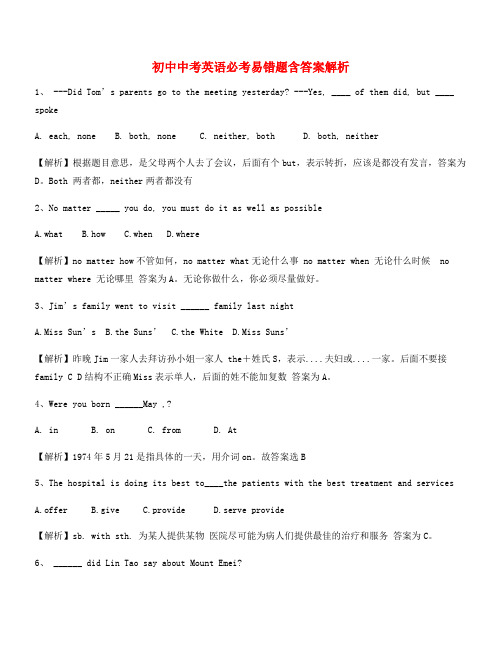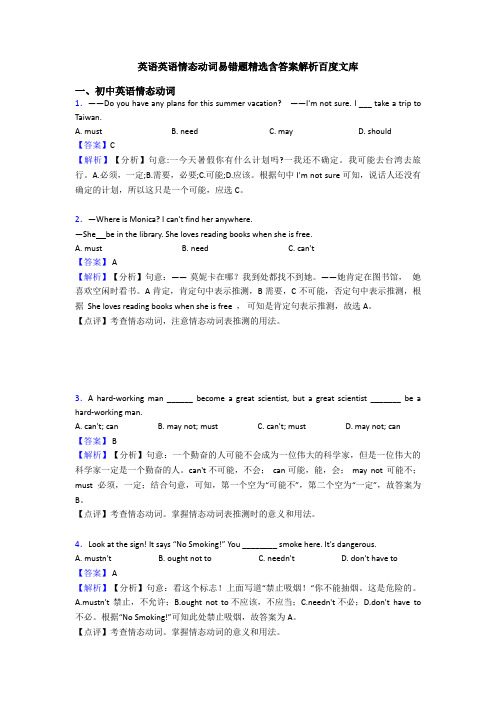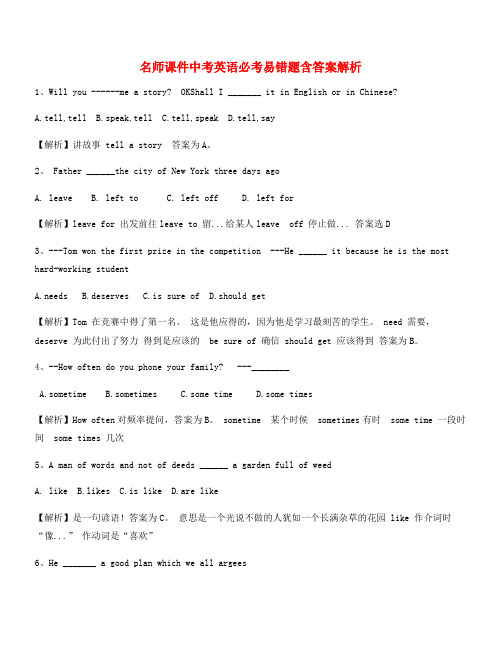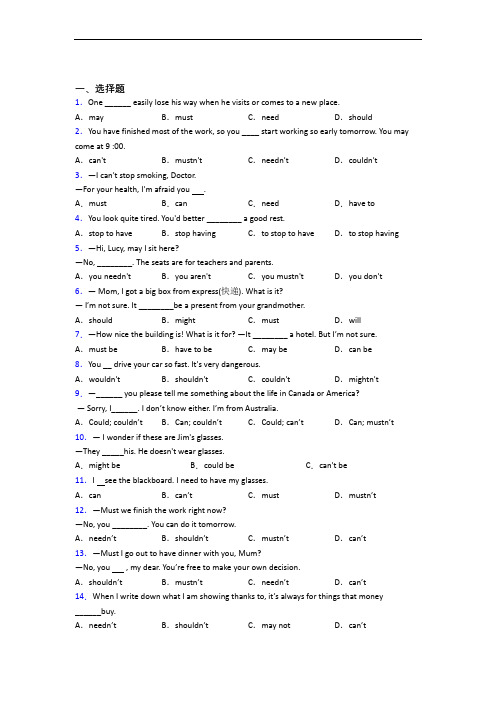英语陷阱题13——情态动词
- 格式:doc
- 大小:51.00 KB
- 文档页数:3

初中中考英语必考易错题含答案解析1、 ---Did Tom’s parents go to the meeting yesterday? ---Yes, ____ of them did, but ____ spokeA. each, noneB. both, noneC. neither, bothD. both, neither【解析】根据题目意思,是父母两个人去了会议,后面有个but,表示转折,应该是都没有发言,答案为D。
Both 两者都,neither两者都没有2、No matter _____ you do, you must do it as well as possibleA.whatB.howC.whenD.where【解析】no matter how不管如何,no matter what无论什么事 no matter when 无论什么时候 no matter where 无论哪里答案为A。
无论你做什么,你必须尽量做好。
3、Jim’s family went to visit ______ family last nightA.Miss Sun’sB.the Suns’C.the WhiteD.Miss Suns’【解析】昨晚Jim一家人去拜访孙小姐一家人 the+姓氏S,表示....夫妇或....一家。
后面不要接family C D结构不正确Miss表示单人,后面的姓不能加复数答案为A。
4、Were you born ______May ,?A. inB. onC. fromD. At【解析】1974年5月21是指具体的一天,用介词on。
故答案选B5、The hospital is doing its best to____the patients with the best treatment and servicesA.offerB.giveC.provideD.serve provide【解析】sb. with sth. 为某人提供某物医院尽可能为病人们提供最佳的治疗和服务答案为C。

英语英语情态动词易错题精选含答案解析百度文库一、初中英语情态动词1.——Do you have any plans for this summer vacation? ——I'm not sure. I ___ take a trip to Taiwan.A. mustB. needC. mayD. should【答案】C【解析】【分析】句意:一今天暑假你有什么计划吗?一我还不确定。
我可能去台湾去旅行。
A.必须,一定;B.需要,必要;C.可能;D.应该。
根据句中I'm not sure可知,说话人还没有确定的计划,所以这只是一个可能,应选C。
2.—Where is Monica? I can't find her anywhere.—She be in the library. She loves reading books when she is free.A. mustB. needC. can't【答案】 A【解析】【分析】句意:——莫妮卡在哪?我到处都找不到她。
——她肯定在图书馆,她喜欢空闲时看书。
A肯定,肯定句中表示推测,B需要,C不可能,否定句中表示推测,根据 She loves reading books when she is free ,可知是肯定句表示推测,故选A。
【点评】考查情态动词,注意情态动词表推测的用法。
3.A hard-working man ______ become a great scientist, but a great scientist _______ be a hard-working man.A. can't; canB. may not; mustC. can't; mustD. may not; can【答案】 B【解析】【分析】句意:一个勤奋的人可能不会成为一位伟大的科学家,但是一位伟大的科学家一定是一个勤奋的人。

名师课件中考英语必考易错题含答案解析1、 Look! Mrs Green is talking ____the students of Class I on the groundA. amongB. in the middle ofC. betweenD. At in the middle【解析】强调位置关系。
“在...中间”不强调几者之间。
两者可以不是同类关系。
如人在池子的中央。
among 两者多为同类,有one of ...的意思答案选B2、--Would you please pass the message on to Tom? ---________A.I’d likeB. I’ll be glad toC.That would be fineD.It’s a pleasure【解析】表示同意请求的回答:Yes,I’d like to/I ‘d love to/I ‘ll be glad to/I should,Ilike to/With pleasure. 答案为B。
to不能省略3、---____ the Internet _____ in your school? ---Yes , but the computer in our office has often broken downA.Is,usedB.Is,usingC.Does ,useD.Has ,used【解析】网络在你们学校使用吗?是被使用,用被动语态。
答案为A。
4、---Maths isn’t as_____ as Chinese ---I agree with you I think Chinese is_____ than any other subjectA.easy, easier B easier, easier C easy,harder D hard, easier as...as【解析】同级比较,中间用原形后面的是两类(中文和其他科目)作比较,用比较级根据句意,数学没有中文容易。

名师课件中考英语必考易错题含答案解析1、Will you ------me a story? OKShall I _______ it in English or in Chinese?A.tell,tellB.speak,tellC.tell,speakD.tell,say【解析】讲故事 tell a story 答案为A。
2、 Father ______the city of New York three days agoA. leaveB. left toC. left offD. left for【解析】leave for 出发前往leave to 留...给某人leave off 停止做... 答案选D3、---Tom won the first prize in the competition ---He ______ it because he is the most hard-working studentA.needsB.deservesC.is sure ofD.should get【解析】Tom 在竞赛中得了第一名。
这是他应得的,因为他是学习最刻苦的学生。
need 需要,deserve 为此付出了努力得到是应该的 be sure of 确信 should get 应该得到答案为B。
4、--How often do you phone your family? ---________A.sometimeB.sometimesC.some timeD.some times【解析】How often对频率提问,答案为B。
sometime 某个时候 sometimes有时 some time 一段时间 some times 几次5、A man of words and not of deeds ______ a garden full of weedA. likeB.likesC.is likeD.are like【解析】是一句谚语!答案为C。


一、选择题1.One ______ easily lose his way when he visits or comes to a new place.A.may B.must C.need D.should2.You have finished most of the work, so you ____ start working so early tomorrow. You may come at 9 :00.A.can't B.mustn't C.needn't D.couldn't3.―I can't stop smoking, Doctor.―For your health, I'm afraid you .A.must B.can C.need D.have to 4.You look quite tired. You'd better ________ a good rest.A.stop to have B.stop having C.to stop to have D.to stop having 5.—Hi, Lucy, may I sit here?—No, ________. The seats are for teachers and parents.A.you needn't B.you aren't C.you mustn't D.you don't 6.— Mom, I got a big box from express(快递). What is it?—I’m not sure. It ________be a present from your grandmother.A.should B.might C.must D.will7.—How nice the building is! What is it for? —It ________ a hotel. But I’m not sure. A.must be B.have to be C.may be D.can be8.You __ drive your car so fast. It's very dangerous.A.wouldn't B.shouldn't C.couldn't D.mightn't 9.—______ you please tell me something about the life in Canada or America?—Sorry, I______. I don’t know either. I’m from Australia.A.Could; couldn’t B.Can; couldn’t C.Could; can’t D.Can; mustn’t 10.— I wonder if these are Jim's glasses.—They _____his. He doesn't wear glasses.A.might be B.could be C.can't be11.I see the blackboard. I need to have my glasses.A.can B.can’t C.must D.mustn’t 12.—Must we finish the work right now?—No, you ________. You can do it tomorrow.A.needn’t B.shouldn’t C.mustn’t D.can’t 13.—Must I go out to have dinner with you, Mum?—No, you , my dear. You’re free to make your own decision.A.shouldn’t B.mustn’t C.needn’t D.can’t 14.When I write down what I am showing thanks to, it’s always for things that money______buy.A.needn’t B.shouldn’t C.may not D.can’t15.— Must I go home? — No, you ________.A.can’t B.mustn’t C.don’t D.needn’t16.---I heard they went skating in the mountains last winter.---It ______ true because there was little snow there.A.may not be B.won’t be C.couldn’t be D.will be 17.—The food ________be delicious . You ate it up .—You bet . My mum cooked it for me .A.must B.may C.can D.need18.Will you please________them________the Birdwatching Society?A.inviting; join B.to invite; to join C.invite; to join D.to invite; join 19.(2017 • 湖北省宜昌市中考)—Life is becoming convenient with the Internet.—That’s true! Almost everything be done online.A.must B.would C.should D.can20.—Must I sleep now? —No, you________.A.needn't B.mustn't C.can't D.may not21.My head teacher has made a set of rules to show what we students ________ and ________ not do in class.A.must; must B.will; willC.need; need D.might; might22.You should________ the teacher________being late for school.A.apology to, about B.apologize to, forC.apologies to, for D.apologize to, on【参考答案】***试卷处理标记,请不要删除一、选择题1.A解析:A【解析】【分析】【详解】句意:当一个人参观或来到一个新地方时可能很容易迷路。
英语英语情态动词易错题精选含答案百度文库一、初中英语情态动词1.—Look! The woman at the school gate ______be her headmaster.—No, it ______ be her. She is holding a meeting in the office now.A. must; can'tB. must; mustn'tC. can; needn'tD. may; mustn't【答案】 A【解析】【分析】句意:——看!学校门口的那个妇女一定是她的校长。
——不,不可能是她。
第一空,must表示“一定”;空二,根据She is holding a meeting in the office now. 她现在正在办公室开会,可知,不可能是校长,用can't,表示不可能。
故选A。
【点评】考查情态动词辨析。
注意不同情态动词的用法,注意理解句意。
2.—Where is Monica? I can't find her anywhere.—She be in the library. She loves reading books when she is free.A. mustB. needC. can't【答案】 A【解析】【分析】句意:——莫妮卡在哪?我到处都找不到她。
——她肯定在图书馆,她喜欢空闲时看书。
A肯定,肯定句中表示推测,B需要,C不可能,否定句中表示推测,根据 She loves reading books when she is free ,可知是肯定句表示推测,故选A。
【点评】考查情态动词,注意情态动词表推测的用法。
3.—Shall we meet at the station at 9 a.m.?—In fact we ______. The train ______until 11a.m.A. needn't; will leaveB. needn't; won't leaveC. mustn't; leavesD. mustn't; doesn't leave【答案】 B【解析】【分析】句意:—我们上午9点在车站见面好吗?—事实上我们不需要。
情态动词典型错误例析1.凯瑟琳会讲一点话。
误:Catherine can speaks a little Cantonese.正:Catherine can speak a little Cantonese.析:情态动词没有人称和数的变化,其后要接动词原形。
2.请问你能帮助我学英语吗?误:May you help me with my English, please?正:Could you help me with my English, please?析:请示别人帮助,应用“Could (Can) you…?〞或者“Would (Will) you …?〞而不用“May you…?〞3.安妮能和你一起去。
误:Annie can be able to go to Beijing with you.正:Annie cam go to Beijing with you.析:can 和be able to 都可以表示才能,意思一样,都有“可以〞的意思,但不能同时使用。
4.刘教师明天能用英语给你写信。
误:Mr Liu will can write to you in English tomorrow.正:Mr Liu will be able to write to you in English tomorrow.析:can 指主语已有的才能、条件,只用于一般如今时和一般过去时的句子中,而be able to 多指主语通过努力而“可以做某事〞,它可用于各种时态的句子中。
5.你可能是对的。
误:You maybe right.正:You may be right.正:Maybe you are right.析:may be 是“情态动词+动词原形〞,在句中作谓语;maybe 是副词,意为“大概、或者许〞,不能作谓语。
6.“我必须呆在这儿吗?〞“不,不必。
〞误:—Must I stay here?—No, you mustn’t.正:—Must I stay here?—No, you needn’t.析:对于问句的否认回容许用needn’t, 而不能用mustn’t。
一、选择题1.—The book report is very important. You ________ write it carefully.—But I ________ hand it in now.A.must; must B.have to; mustC.must; have to D.have to; have to2.— Do you think it is safe to shop online?— I think so. On Taobao, customers return goods with no questions asked,but they ______ pay delivery costs.A.can’t; can B.must; must C.can; have to D.mustn’t; can 3.―I can't stop smoking, Doctor.―For your health, I'm afraid you .A.must B.can C.need D.have to4.―I didn’t pass the driving test again.―Don't worry. Just like the weather, life be beautiful all the time.A.can't B.needn't C.shouldn't D.mustn't5.You look quite tired. You'd better ________ a good rest.A.stop to have B.stop having C.to stop to have D.to stop having 6.—Jenny, you _________ push your way onto the bus.—I’m really sorry about it.A.mustn’t B.needn’t C.may not7.—Hi, Lucy, may I sit here?—No, ________. The seats are for teachers and parents.A.you needn't B.you aren't C.you mustn't D.you don't 8.—______ you please tell me something about the life in Canada or America?—Sorry, I______. I don’t know either. I’m from Australia.A.Could; couldn’t B.Can; couldn’t C.Could; can’t D.Can; mustn’t 9.—Susan, someone is waiting for you on the phone. It_______ be your sister, but I’m not sure.—Oh, please tell her to call me_______ because I’m busy now.A.might; later B.must; later C.might; late D.must; late 10.Since you are very tired, you ______ finish the work today.A.needn’t B.may not C.mustn’t D.can’t 11.—Look! Mrs. Smith is standing in front of the teaching building.—It______ her. She has gone to Egypt for her holiday.A.must be B.mustn’t be C.can be D.can’t be 12.—Could I call you by the first name?—Yes, you .A.will B.could C.may D.might13.One ______ easily lose his way when he visits or comes to a new place.A.may B.must C.need D.should14.This book _____ Lucy’s. Look! Her name is on the book cover.A.must be B.may be C.can’t be D.mustn’t be 15.Everyone______ be polite to their parents.A.could B.may C.should D.can16.Will you please________them________the Birdwatching Society?A.inviting; join B.to invite; to join C.invite; to join D.to invite; join 17.一Hurry up, Mark! Let's cross the road as quickly as possible.一No,you . Don't you see the light is still red?A.couldn't B.wouldn't C.mustn't D.needn't 18.—Mum, I’ve signed for a big box by Future Express (快递). What’s in it?—I’m not sure. It ________be a present from your brother.A.need B.must C.may D.will19.—Could you help me download some Taylor Swift’s songs from Ku Gou?—Sorry, people download music from the Internet without paying, because it’s against the law. A.wouldn’t B.needn’tC.mustn’t D.couldn’t20.My head teacher has made a set of rules to show what we students ________ and ________ not do in class.A.must; must B.will; willC.need; need D.might; might21.—I often see Maria in the library, and she _________ like reading best.—That’s right.A.need B.may C.must D.can22.—Can you come to my party on Saturday afternoon?—Sorry, I can’t. I ________ meet my friends.A.can’t B.might have to C.needn’t【参考答案】***试卷处理标记,请不要删除一、选择题1.C解析:C【解析】【分析】【详解】句意:——这个读书报告很重要。
易错点09情态动词和虚拟语气目录01易错陷阱(4大陷阱)02举一反三【易错点提醒一】情态动词基本用法易混易错点【易错点提醒二】情态动词表判断推测易混易错点【易错点提醒三】情态动词后+have done易混易错点【易错点提醒四】虚拟语气易混易错点03易错题通关易错陷阱1:情态动词基本用法易混易错点。
【分析】功能:情态动词不能单独作谓语,后跟动词原形共同构成谓语。
形式:情态动词没有人称和数的变化。
否定形式是多数情态动词的否定式是在情态动词的后面加not。
时态:个别情态动词有现在式和过去式两种形式,过去式用来表达更加客气、委婉的语气。
位置:情态动词在谓语之前;谓语动词前若有助动词,则在助动词之前。
疑问句中在主语之前。
【高频考点】1.can/could表能力、请求、可能性(表示可能性用于否定句及疑问句中);特殊句型:can not...too.../enough(再怎么……也不过分)、can't help but do sth.(不得不做某事)、can't wait to do sth.(迫不及待地做某事)。
2.may/might表较小的可能性;表示请求许可以及祝愿。
句型和搭配:may/might as well do表示“还是……好;最好……”;may well do表示“很可能”;may可以用来表示祝愿,用“may+主语+动词原形”结构。
May you succeed.祝你成功。
3.must表示非常肯定的推测;表“偏要;非要……不可”;mustn't意为“禁止”,表示“不必”应用needn't。
4.shall的用法用于第二、三人称的陈述句中,表命令、警告、许诺或威胁等,语气强于should;用于第一、三人称的疑问句中,表示征询意见。
5.should/ought toshould表责任、义务、劝告、建议等,意为“应该”,还可表出乎意料的语气,意为“竟然”;ought to表义务或责任,意为“应该”。
英语陷阱题——情态动词【例题】1.“Mike is often absent from class.” “Tell him he _____ answer for it if he goes on behaving like that.”A. shallB. willC. wouldD. can<陷阱>几个干扰项均有可能误选。
<分析>最佳答案选A。
shall 用作情态动词主要有以下两个用法:(1) 用于疑问句中征求意见。
如:Shall I help you? 要不要我帮帮你?Shall I open the window? 要我把窗子打开吗?(2) 用于陈述句中表示允诺、告诫、警告、威胁、命令、规定、必然性等(可用于各类人称)。
如:You shall suffer for this.你会为此事吃苦头的。
(表威胁)Each competitor shall wear a number.每个参赛者要戴一个号码。
(表规定)You shall hear everything as soon as you come.你一来就可听到所有情况了。
(表允诺)以下试题答案均选shall:(1) “I promise that she _____ get a nice present on her birthday.” “Will it be a great surprise to her?”A. shouldB. mustC. wouldD. shall2. You _______ pay too much attention to your reading skill, as it is so important.A. cannotB. shouldn’tC. mustn’tD. needn’t<陷阱>几个干扰项均有可能误选。
<分析>最佳答案选A。
cannot…too…是英语中一个十分有用的表达,意为“不可能太……,无论怎样……也不算过分,越……越……”。
如:You can’t be too careful. 你越仔细越好。
You can’t praise the too much.这本书值得大加赞扬。
We cannot work too much for the people.我们为人民做工作是不可能做过头的。
A woman cannot have too many clothes.女人买的衣服再多也不算多。
注:有时也可用can never, impossible 等与too连用来表示类似意思。
如:It is impossible to get there too soon. 去那儿越早越好。
3.“Is John coming by train?” “He should, but he _____ not. He likes driving his car.”A. mustB. canC. needD. may<陷阱>可能误选B或C。
<分析>最佳答案为D。
may 表推测,may not 意为“可能不(会坐火车来)”。
句中的He should 为He should come by train 之省略,由于其后出现转折连词but,说明语意有变化,再结合下文的He likes driving his car,便可决定此题选D。
注意,不能选B,因为can 表示推测时通常不用肯定陈述句。
4.“I heard they went skiing in the mountains last winter.” “It ____ true because there was little snow there.”A. may not beB. won’t beC. couldn’t beD. mustn’t be<陷阱>几个干扰项均有可能误选。
<分析>此题最佳答案为C,主要由下文的because there was little snow there 这一语境所决定,既然“没下什么雪”,那么“滑雪”就应是“不可能”,所以选couldn’t be,即选C。
5.“Do you think he is lazy?” “I _____ so once, butI don’t now.”A. may have thoughtB. can have thoughtC. may thinkD. might think答案选A。
从答话人的语境可知,空格处的意思“曾经这样想过”,即对过去情况作推测,故应用“情态动词+动词完成式”;又因为can 表推测不用于肯定句,故选A。
类例:Their answers are exactly the same — one of them ______ from the other.A. must copyB. must have copiedC. should copyD. should have copied答案选B,既然两人的答案完全一样,说明“抄袭”已经发生,故用“情态动词+动词完成式”,根据句意,应选B而不能选D。
6.You _____ be right, but I don’t think you are.A. canB. couldC. mustD. should<陷阱>几个干扰项均有可能误选。
<分析>从语境上看,C、D不宜选,在剩下的A和B 中,许多同学想当然地选了A,认为整个句子为现在时态,所以选can,而不选过去式could,但是最佳答案却是B而不是A。
按照英语语法,情态动词can 用于推测表示可能性时,通常只用于否定句或疑问句中,而不用于肯定句中;但could 用于表推测时,却不仅可用于否定句和疑问句,也可用于肯定句,且此时的could 并不是can 的过去式,与can 也没有时间上的差别,只是could 比can语气更委婉,所以答案选B。
注:can 在以下特殊情况下,也可用于肯定句。
一是表示抽象的可能性,即从理论上或逻辑上分析是可能的,但是实际上未必会发生。
如:Anyone can make mistakes. 任何人都可能会犯错误。
二是后接“be (get, seem, become)+形容词”,表示“有时会”、“时常会”等。
如:My father can be very unreasonable. 我父亲有时候很不讲道理。
【练习】1.“I thought you wouldn’t mind.” “Well, as ama tter of fact I don’t, but you _____ me first.”A. should askB. should have askedC. must askD. must have asked选B,should 后接动词完成式表示“本来应该做某事,结果未做”,此处含有责备之意2.“I called you yesterday. A woman answered, butI didn’t recognize her voice.” “Oh, it _____ my aunt Jean.”A. must beB. must have beenC. might beD. can have been选B,对过去情况的肯定推测,宜用“情态动词+ 动词完成式”,再根据句意,可确定答案为B。
注:can 表示推测通常不用于肯定陈述句3. That car nearly hit me; I ______.A. might be killedB. might have been killedC. may be killedD. may been killed选B,表示过去可能发生而实际上未发生的事,用might + 动词完成式。
若只是推测过去可能已经发生的事,则可用may [might] + 动词完成式,如He may [might] have gone. 他可能已经走了4.It’s a very kind offer, but I really _____ accept it.A. mustn’tB. needn’tC. can’tD. don’t选C。
由句意可知5. T he police still haven’t found her, but they’re doing all they _____. A. may B. can C. must D. will 选B,do all one can 意为“尽力”或“竭尽全力”6. You _____ practise the drums while the baby is sleeping.A. needn’tB. mightn’tC. mustn’tD. won’t 选C,mustn’t 在此相当于can’t,且语气更强7. You _____ him the news; he knew it already.A. needn’t tellB. needn’t have toldC. mightn’t tellD. mightn’t have told选B,“needn’t + 动词完成式”的意思是:本来不必做某事,但实际上做了。
上句意思是“你本来不必告诉他这个消息的,因为他(当时)已经知道了”。
注意,句中knew 为过去式8.As she’s not here, I suppose she _____ home.A. must goB. must have goneC. might goD. might be going选B,must 后接动词完成式表示对过去情况的肯定推测,意为“一定已经做了某事”9. Are you still here? You ______ home hours ago.A. should goB. should have goneC. might goD. may have gone选B,should 后接动词完成式表示“本来应该做某事,结果未做”10.“I called you yesterday. A woman answered, but I didn’t recognize her voice.” “Oh, it _____ my aunt Jean.”A. must beB. must have beenC. might beD. can have been选B,对过去情况的肯定推测,宜用“情态动词+ 动词完成式”,再根据句意,可确定答案为B。
注:can 表示推测通常不用于肯定句11. I _______ have met him a long time ago. Both his name and face are very familiar.A. mayB. canC. wouldD. should选A。